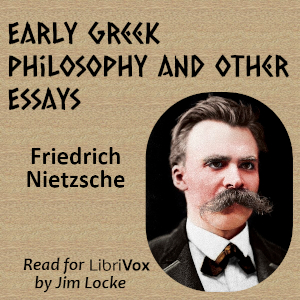This is a compilation of the thoughts on art, science and life of Leonardo da Vinci, translated by Maurice Baring and edited by Lewis Einstein. - Summary by A. Gramour
18 episodes
Definitions is a dictionary of 184 terms, originated in Plato’s Academy. Until late antiquity Plato was named as the author of this work, but in the anonymous Prolegomena to Platonic Philosophy, 10. 26. 4 Speusippus is mentioned as the author.
The 32 Epigrams are attributed to Plato and are short poems written in the form of elegiac couplets.
(Summary by Maria Sozopoulou)
Οἱ Ὅροι εἶναι ἕνα λεξικὸ μὲ 184 ὅρους, τὸ ὁποῖο προέρχεται ἀπὸ τὴν Πλατωνικὴ Ἀκαδημία. Μέχρι καὶ τὴν ὕστερη ἀρχαιότητα συγγραφέας τῶν Ὅρων θεωρεῖτο ὁ Πλάτων, ὅμως στὸ ἔργο τοῦ ἀνωνύμου Προλεγόμενα τῆς Πλάτωνος φιλοσοφίας, 10. 26. 4 ἀναφέρεται ὡς συγγραφέας ὁ Σπεύσιππος.
Τὰ 32 Ἐπιγράμματα ἀποδίδονται στὸν Πλάτωνα. Πρόκειται γιὰ μικρὰ ποιήματα γραμμένα σὲ ἐλεγειακὸ δίστιχο.
33 episodes
Auguste Comte was from France and published this book in French in 1844. He made a very great impact on the sciences and claims to have “discovered the principal laws of Sociology." Comte says Reason has become habituated to revolt but that doesn’t mean it will always retain its revolutionary character. He discusses Science, the trade-unions, Proletariat workers, Communists, Capitalists, Republicans, the role of woman in society, the elevation of Social Feeling over Self-love, and the Catholic Church in this book. His goal is to replace theology with philosophy and develop the Religion of Humanity where Imagination is subordinate to Reason as Reason is to Feeling. Positivism can be summed up in this statements from his conclusion: “Love, then, is our principle; Order our basis; and Progress our end.” This is the 1908 edition of the book. - Summary by Craig Campbell
33 episodes
Nietzsche gives a series of lectures in Bale, Germany on the subject of German educational institutions, and what the best way forward. Summary by Aaron.
11 episodes

The Seven Sages of Hellas were philosophers, statesmen, and law-givers of the early sixth century BCE. They were well known for their wisdom.
The Delphic Maxims are a set of 147 aphorisms inscribed at Delphi. It is said that they were given by god Apollo to the Delphi Oracle.
The Seven Sages and Delphic Maxims are preserved in Joannes Stobaeus “Anthologium” (also “Florilegium”). Stobaeus attributes the Delphic Maxims not to God Apollo but to the Seven Sages, yet most scholars today believe that their original author is uncertain.
In this audio book, the edition that has been used for the recording is the C. Wachsmuth& O. Hense (1912, Vol. III. I. 172-173).
(Summary by Maria Sozopoulou)
Οἱ Ἑπτὰ Σοφοὶ τῆς Ἐλλάδος ἦταν φιλόσοφοι, πολιτικοὶ καὶ νομοθέτες, οἱ ὁποῖοι ἔζησαν στὶς ἀρχὲς τοῦ ἕκτου αἰώνα π. Κ. Χ. καὶ ἦταν ξακουστοὶ γιὰ τὴν σοφία τους.
Τὰ Δελφικὰ Παραγγέλματα εἶναι μία συλλογὴ 147 ἀποφθεγμάτων, ποὺ ἦταν χαραγμένα στὸ Μαντεῖο τῶν Δελφῶν. Λέγεται ὅτι εἶχαν δοθεῖ στὸ Μαντεῖο ἀπὸ τὸν θεὸ Ἀπόλλωνα.
Οἱ Ἑπτὰ Σοφοὶ καὶ τὰ Δελφικὰ Παραγγέλματα ἔχουν διασωθεῖ στὸ «Ἀνθολόγιον» τοῦ Ἰωάννη Στοβαίου, ὁ ὁποῖος ἀποδίδει τὰ Δελφικὰ Παραγγέλματα στοὺς Ἑπτὰ Σοφούς. Οἱ περισσότεροι μελετητὲς σήμερα θεωροῦν ὅτι ὁ πραγματικὸς συγγραφέας τῶν Δελφικῶν Παραγγελμάτων εἶναι δύσκολο νὰ προσδιοριστεῖ.
Σὲ αὐτὸ τὸ ἠχητικὸ βιβλίο ἡ ἔκδοση τοῦ «Ἀνθολογίου», ποὺ χρησιμοποιήθηκε γιὰ τὴν ἠχογράφηση, εἶναι ἡ C. Wachsmuth& O. Hense (1912, Vol. III. I. 172-173).
8 episodes
Στο Φαίδων, ο Πλάτωνας μας παρουσιάζει τις συζητήσεις που έκανε ο Σωκράτης με μαθητές του πριν πιει το κώνειο και αφορούν φιλοσοφικά, ηθικά και ψυχολογικά ζητήματα - Summary by karampas1968
23 episodes
In seinem Buch, Der Judenstaat. Versuch einer modernen Lösung der Judenfrage versucht Theodor Herzl eine jüdische Antwort auf die damals so genannte Judenfrage aufzuzeigen. Es geht bei dem Judenstaat nicht so sehr um Religion, sondern um die Idee einen eigenen Staat für die Juden zu schaffen und somit auch die Judenfrage zu beantworten. Hierzu will Herzl eine Gesellschaft, die Jewish Company gründen, welche die Organisation der Staatenbildung (Landkauf, Infrastruktur, Zuwanderung usw.) übernimmt. Summary by lorda
8 episodes

Some men write their lives to save themselves from ennui, careless of the amount they inflict on their readers.
Others write their personal history, lest some kind friend should survive them, and, in showing off his own talent, unwittingly show them up.
Others, again, write their own life from a different motive—from fear that the vampires of literature might make it their prey.
I have frequently had applications to write my life, both from my countrymen and from foreigners. Some caterers for the public offered to pay me for it. Others required that I should pay them for its insertion; others offered to insert it without charge. One proposed to give me a quarter of a column gratis, and as many additional lines of eloge as I chose to write and pay for at ten-pence per line. To many of these I sent a list of my works, with the remark that they formed the best life of an author; but nobody cared to insert them.
I have no desire to write my own biography, as long as I have strength and means to do better work.
The remarkable circumstances attending those Calculating Machines, on which I have spent so large a portion of my life, make me wish to place on record some account of their past history. As, however, such a work would be utterly uninteresting to the greater part of my countrymen, I thought it might be rendered less unpalatable by relating some of my experience amongst various classes of society, widely differing from each other, in which I have occasionally mixed.
This volume does not aspire to the name of an autobiography. It relates a variety of isolated circumstances in which I have taken part—some of them arranged in the order of time, and others grouped together in separate chapters, from similarity of subject.
The selection has been made in some cases from the importance of the matter. In others, from the celebrity of the persons concerned ; whilst several of them furnish interesting illustrations of human character. - Summary by From the Preface
40 episodes
The Principles of Philosophy, originally published in Latin in 1644, and translated to French in 1647, sets forth the principles of nature--the Laws of Physics--as Descartes viewed them. The book provides a systematic statement of natural philosophy and metaphysics, and represents the first truly comprehensive, mechanistic account of the universe.
The Selections from the Principles of Philosophy contains the whole of the first part of the book ("Of the Principles of Human Knowledge"), as well as selections from the second ("Of the Principles of Material Things"), third ("Of the Visible World"), and fourth part ("Of the Earth") of the book. (Foon)
11 episodes

John Locke wrote four essays on human (or humane) understanding. Here are a few quotes from the book: "I see no reason to believe, that the soul thinks before the senses have furnished it with ideas to think on. The dreams of sleeping men are, as I take it, all made up of the waking man's ideas, though for the most part oddly put together. Can the soul think, and not the man, or a man think, and not be conscious of it? Suppose the soul of Castor separated, during his sleep, from his body, to think apart. Let us suppose too, that it chooses for its scene of thinking the body of another man, v. g. Pollux, who is sleeping without a soul. Nobody can imagine that his soul can think, or move a body at Oxford, whilst he is at London. The question is, whether if the same substance which thinks, be changed, it can be the same person; or, remaining the same, it can be different persons? Whiteness and coldness are no more in snow than pain is."John Locke wrote four essays on human (or humane) understanding. The first and second have been recorded into LibriVox. This recording is a repetition of the second of Locke's Essays. All of his essays were, and are, very influential. Edward Stillingfleet 1635-1699 (Bishop of Worcester) wrote a Critique of Locke’s ideas and many letters to him. Locke’s Essays inspired Gottfried Leibniz (1646-1716) to write his New Essays Concerning Human Understanding and Victor Cousin analyzed all four books in his 1834 Elements of Psychology. - Summary by Craig Campbell
32 episodes
Une réflexion sur la Littérature, par un homme de Lettres, aussi poète, et homme politique actif, à méditer. Un bel enrichissement, écrit d’une plume talentueuse au service d’une intelligence sensible. - Summary by ChristianeJehanne
4 episodes

Phänomenologie des Geistes (1807) is Georg Wilhelm Friedrich Hegel's most important and widely discussed philosophical work. Hegel's first book, it describes the three-stage dialectical life of Spirit. The title can be translated as either The Phenomenology of Spirit or The Phenomenology of Mind, because the German word Geist has both meanings. Phenomenology was the basis of Hegel's later philosophy and marked a significant development in German idealism after Kant. Focusing on topics in metaphysics, epistemology, physics, ethics, history, religion, perception, consciousness, and political philosophy, The Phenomenology is where Hegel develops his concepts of dialectic (including the Master-slave dialectic), absolute idealism, ethical life, and Aufhebung. The book had a profound effect in Western philosophy, and "has been praised and blamed for the development of existentialism, communism, fascism, death of God theology, and historicist nihilism."
Note, this is the second volume of two.
(Wikipedia)
29 episodes

Comme l'indique le titre, ce sont différents pensées de l'auteur, sur la vie, l'être humain, aussi la vie politique, avec deux textes, "De la Monarchie selon la Charte", et "Réflexions politiques". Chateaubriand, homme de lettres si talentueux et homme politique, Pair de France, fut un très ardent défenseur de la liberté d'expression, de la monarchie représentative et de la Charte constitutionnelle du 4 juin 1814.
Louis XVIII souhaitait rassembler les Français, bonapartistes, républicains et nostalgiques de l'Ancien régime.
Puis il y eut les "Cent-jours", en 1815.>
Louis XVIII est réfugié à Gand, puis rentre et la Seconde Restauration est établie.
Son neveu, le Duc de Berry, est assassiné en 1820.
Voir, à ce sujet, le livre audio : "Mémoires, lettres et pièces authentiques touchant la vie et la mort du Duc de Berry", de François-René de Chateaubriand, très intéressant, documenté, sur le plan de l'Histoire de France.
Ces deux Livres audio se complètent.
La nature a aussi sa place, ici, avec le joli recueil de dix poésies: "Tableaux de la nature".
- "Nous verrons" est un poème ironique, sur le temps, l’humain, et la politique, les gazettes…
- "Les Tombeaux champêtres" sont une élégie imitée de Gray, 1796, Londres. L'auteur y fut en exil.
Suivent des textes poétiques:
- sur la Révolution, la profanation des tombes royales de la basilique Saint-Denis, Napoléon, Condé et son descendant, le jeune Duc d'Enghien mort en 1804 exécuté dans les fossés de Vincennes, choc absolument intense pour les Monarchistes, écrit en 1812;
- en hommage à la Reine de Prusse, méprisée par Napoléon, écrit à Berlin en 1821;
- "Les Alpes ou l'Italie" écrit en 1822, la vie de l'auteur;
- "Le Départ", Paris 1827, souvenirs de ses voyages et la fin de la vie.
Ceci pour clore cette Compilation consacrée à F.-R. de Chateaubriand. - Summary by ChristianeJehanne
27 episodes
We have seen that as mankind rises in the scale of civilization the body becomes increasingly less important. Nevertheless, I wish it to be clearly understood, that I do not maintain that it is preferable to be ill than well, but only that each state has its own peculiar privileges, which are rarely interchangeable.
Health and sickness are merely different roads to achievement. The earth requires rain as well as sunshine; we need both tears and laughter; navvies are necessary and so are philosophers.
The book details how people from many professions who had some or other physical disability or pain reached their goals. The introduction is by Kate Douglas Wiggin.
- Summary by Stav Nisser and the conclusion of the book.
17 episodes
The History of Philosophy is the exposition of philosophical opinions and of systems and schools of philosophy. It includes the study of the lives of philosophers, the inquiry into the mutual connection of schools and systems of thought, and the attempt to trace the course of philosophical progress. Topics covered include Ancient Philosophy (Babylon, China, India, Egypt, Greece and Rome) Christian Era Philosophy (St. Anselm, Thomas Aquinas, William of Ockam) and Modern Philosophy (including Descartes, Spinoza, Kant and Hegel.) (Summary by Beth Thomas and the Introduction)
65 episodes
The essays contained in this volume treat of various subjects. With the exception of perhaps one we must consider all these papers as fragments. Written during the early Seventies, and intended mostly as prefaces, they are extremely interesting, since traces of Nietzsche's later tenets — like Slave and Master morality, the Superman — can be found everywhere. But they are also very valuable on account of the young philosopher's daring and able handling of difficult and abstruse subjects. "Truth and Falsity," and "The Greek Woman" are probably the two essays which will prove most attractive to the average reader. - from the Preface.
13 episodes
In this famous early work of German philosopher Friedrich Nietzsche, he investigates the artistic characteristics of Apollonian (reason) and Dionysian (passion) characteristics in Greek art, specifically in Greek tragedy as it evolved. Then he applies his conclusions about Greek tragedy to the state of modern art, especially modern German art and specifically to the operas of Richard Wagner.
27 episodes
This work is a look at the life and ideas of Thomas Hobbes, English philosopher of the seventeenth century. The most important ideas are found in his famous work Leviathan. Taylor looks at such concepts of Hobbes as the contract, naturalism, sovereignty, natural laws, church and state, absolutism, and political obligation, etc.
9 episodes
Dr. Pascal brings us the Theosophic knowledge to reincarnation. He discusses four main topics: 1). The Soul and the Bodies, 2). Reincarnation and the Moral Law, 3). Reincarnation and Science, and 4). Reincarnation and the religious and philosophical concensus of the ages - Summary by kirk202
11 episodes


















